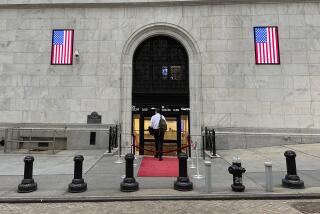Samsung Admits to Price Fixing
- Share via
SAN FRANCISCO — The world’s largest maker of chips for storing data on personal computers and smaller gadgets admitted Tuesday that it conspired with its rivals to fix prices between 1999 and 2002.
Samsung Electronics Co. agreed to plead guilty in U.S. District Court in San Francisco and pay $300 million, the second-largest antitrust fine ever assessed by the federal government, for its role in corrupting the $26-billion-a-year market.
The effects of the conspiracy were relatively small at the retail level, adding perhaps $10 to the cost of a given PC, analysts said. But with more than 100 million machines sold each year, that would work out to more than $1 billion in excess annual profit.
Samsung’s admission is the fourth by a top maker of dynamic random access memory chips, known as DRAM chips, and caps a probe that began in 2002, shortly after Dell Inc. founder Michael Dell complained at a financial conference that the chip makers were exhibiting “cartel-like behavior.”
Dell and others were confounded when DRAM prices more than quadrupled even as demand tailed off after the dot-com crash in 2000 and 2001. A Dell Inc. spokesman declined to say whether the company’s chairman had contacted the Justice Department. The department declined to say what triggered the three-year probe.
DRAM chips now contribute about $60 to the cost of a $1,000 personal computer, said IDC analyst Shane Rau. Prosecutors did not say how much companies were overcharged by Samsung and competing chip makers, but they said the figure could easily run into the billions of dollars.
Prices careened from about $18 a chip to less than $1 and back to $5 before investigators took action and the cost leveled off, according to pending consumer lawsuits filed against Samsung and others. DRAM chips, the main form of memory used during a single sitting at a computer, are also used in cellphones, digital cameras and VCRs.
Dell and Apple Computer Inc. were among those that passed higher prices on to consumers, said Thomas Barnett, the Justice Department’s acting antitrust chief, who called Samsung “one of the leading participants in the conspiracy.”
Hynix Semiconductor Inc., which like Samsung is based in South Korea, pleaded guilty in May and agreed to pay $185 million. German firm Infineon Technologies pleaded guilty last year and is paying $160 million.
Micron Technology Inc. of Boise, Idaho, the largest U.S. DRAM firm, was the first in the ring to come forward with evidence and will probably be spared prosecution under an amnesty program, analysts said. The four companies together sell about 75% of the world’s DRAM chips.
Five individuals, most of them from Infineon, have served criminal sentences of as long as six months, and Samsung’s deal leaves seven unnamed executives open to prosecution as the inquiry continues.
Although the Justice Department did not specify how it calculated its fine against Samsung, antitrust penalties are often set by market share. Samsung has about 31% of the DRAM market, followed by Hynix with 17%, Micron with 15% and Infineon with 14%, according to research firm ISuppli Corp.
The record U.S. antitrust fine is $500 million, which was levied in 1999 against Swiss pharmaceutical firm Roche Holding Ltd. for its role in fixing prices on vitamins.
Barnett said DRAM investigators found internal e-mails at the target companies that described the illegal arrangements.
“They discuss the prices of DRAM that were out there and what would be offered, and they carried through,” he said.
The deals had been hammered out in telephone calls and at least some face-to-face meetings, Barnett said.
Especially during the time of the conspiracy, DRAM presented computer makers with some of their thorniest decisions, analyst Rau said. Dell, Hewlett-Packard Co., IBM Corp. and other big manufacturers had to choose how much to buy and which of several rapidly changing formats to bank on.
The chip makers also may have violated antitrust law by conspiring to push some formats at the expense of others, said analyst Michael Cohen of Pacific American Securities.
Upstart chip architect Rambus Inc., which is embroiled in lawsuits with most of its rivals, has argued that those companies conspired to reject Rambus designs that Intel Corp. wanted built for its multi-chip packages.
An administrative judge at the Federal Trade Commission found in 2004 that the manufacturers did work together. E-mails from competing companies’ executives and consultants showed that they told computer makers to expect high prices for the Rambus chips, then kept their rival chips inexpensive until after the companies gave up on the Rambus design. After that, the manufacturers again began raising prices on their core chips.
The Justice Department’s price-fixing case “is part of a bigger picture,” Cohen said. The analyst, who owns Rambus shares, noted that other rulings had gone against that firm.
In a brief statement, Samsung said it was “committed to fair competition and ethical practices.”
It declined to say whether the seven executives still under investigation remained at the company and did not elaborate further.
The parent company, Samsung Group, has recently faced criticism in its home country for its strong influence in politics, its 15% share of the national economy and its leading position in such diverse industries as life insurance and credit cards.
Samsung today reported third-quarter profit of 1.88 trillion won ($1.83 billion), a drop of 30% from a year earlier. Revenue rose 1.4% to 14.54 trillion won.
*
(BEGIN TEXT OF INFOBOX)
Market leaders
Top makers of memory chips known as DRAM, their home countries and their market shares in the second quarter
Samsung (South Korea): 30.7%
Hynix (South Korea): 16.5%
Micron (U.S.): 14.7%
Infineon (Germany): 13.6%
Elpida (Japan): 7.0%
*
Source: ISuppli
More to Read
Inside the business of entertainment
The Wide Shot brings you news, analysis and insights on everything from streaming wars to production — and what it all means for the future.
You may occasionally receive promotional content from the Los Angeles Times.










